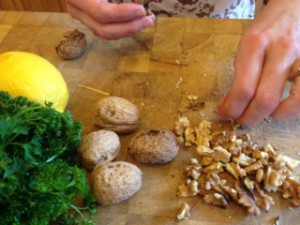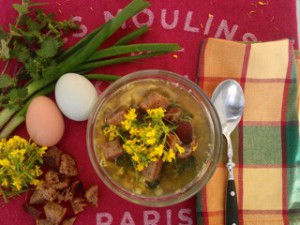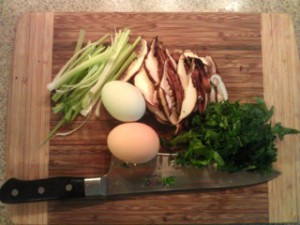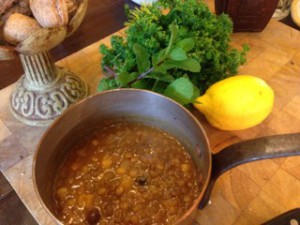Wednesday
Community ArticlesCan Home Cooking Restore Enlightened Society?
by Marcella Friel, Crestone, Colorado
“Internal drala also comes out of making a proper relationship to food…. You can take the time to plan good, nutritious meals, and you can enjoy cooking your food, eating it, and then cleaning up and putting the leftovers away.”
~ Chogyam Trungpa, Shambhala: The Sacred Path of the Warrior
In modern society, we are confronting an unprecedented dilemma in human evolution:
On the one hand, procuring food has never been easier.
Unlike our ancestors who had to spear the wooly mammoth or till stubborn earth for a single turnip, we have restaurants, drive-ins and cafeterias preparing more food than we could ever consume. With a word, a click or a scan, our victuals appear magically before us, with far less effort than exerted by our forebears.
Yet we’re still hungry.
It’s not that our distended bellies growl as we stare glassy-eyed at an empty bowl. We long for deeper nourishment than take-out can provide.
We long for home-cooked meals eaten with those we love.
The meal table is the fulcrum of human civilization. Our capacity to cook food is what distinguishes us from other animals. Sharing food is how we first learn to become relational. Whether the fare is tasty or terrible, knowing those who prepared it, sitting at the table with them, making eye contact and engaging in conversation provide sustenance that mere caloric intake cannot supply.
And while we might feel diffident about home cooking, we subconsciously miss it as we open take-out cartons, eat at our desks, or graze mindlessly. We mourn its loss as we ruefully watch family members chow down microwaved meals while checking Facebook.
Where did home cooking go? Why does it matter? And how does home cooking contribute to enlightened society?
A little history might be helpful.
Whither Home Cooking?
 According to food historian Laura Shapiro, after World War II, the military food-production technology that churned out K-rations for hungry troops was turned to civilian use. The processed food industry heavily marketed housewives to regard home cooking as drudgery and seduced them to opt instead for “sophisticated” instant foods: canned meats, freeze-dried coffee, dehydrated potatoes, powdered orange juice.
According to food historian Laura Shapiro, after World War II, the military food-production technology that churned out K-rations for hungry troops was turned to civilian use. The processed food industry heavily marketed housewives to regard home cooking as drudgery and seduced them to opt instead for “sophisticated” instant foods: canned meats, freeze-dried coffee, dehydrated potatoes, powdered orange juice.
Initially, women didn’t like the taste of these new creations; nor did they like not cooking.
The industry responded by fashioning convenience foods so that the preparer performed at least one faux-cooking action: “add milk to special sauce packet”; “beat one egg into cake mix.”
As the 1960s unfolded, home cooking became tantamount to domestic slavery, while women migrated from the stove to the office desk. The food industry capitalized on this shift by promoting convenience foods as allies of women’s liberation.
Nearly half a century later, the home-cooked meal has gone the way of the rotary-dial telephone: a quaint vestige of a slower past. But the fallout of that loss is neither quaint nor charming.
Why Does Home Cooking Matter?
 Food journalist Michael Pollan points out that we Americans spend an average of 27 minutes per day on meal preparation, and most of that involves heating a can of soup or microwaving a frozen pizza. Our favorite meal, for both lunch and dinner, is a sandwich and a soda.
Food journalist Michael Pollan points out that we Americans spend an average of 27 minutes per day on meal preparation, and most of that involves heating a can of soup or microwaving a frozen pizza. Our favorite meal, for both lunch and dinner, is a sandwich and a soda.
We widely regard cooking as an obstacle to the rest of our life. We complain that it takes too much time; yet, in the past 15 years we’ve found an extra 2½ hours a day to surf the Internet.
As the time cost of food preparation has fallen, calorie consumption has risen. It’s no secret that processed foods are laden with refined sugars, rancid fats, and excess sodium. We’re so rife with cancer, diabetes and obesity we’ve come to regard them as normal occurrences in human life.
Allowing corporations to cook for us has not only made us fatter and sicker. The loss of home cooking and community meals, combined with other factors, has plunged us into a life-threatening epidemic of alienation. As renowned cardiologist Dean Ornish puts it, “There isn’t any other factor in medicine … that has a greater impact on our quality of life, incidence of illness and premature death from all causes than loneliness and isolation.”
Where Do We Go from Here?
 While our industrialized, alienated eating patterns have spawned a labyrinth of personal and social consequences so intertwined as to seem impossible to reverse, that perception, like any other, has no solid reality.
While our industrialized, alienated eating patterns have spawned a labyrinth of personal and social consequences so intertwined as to seem impossible to reverse, that perception, like any other, has no solid reality.
Rediscovering sanity with food is a simpler journey than we might believe.
Just as we do on the meditation cushion, we can slow down. Which leads naturally to appreciation.
Appreciation is how we, as humans, join heaven and earth. As the Vidyadhara, Chogyam Trungpa Rinpoche pointed out, how we use our fork and knife (indeed, whether we use a fork and knife) is an extension of our sanity. To set a table, invite a loved one, put on music — all such gestures are small deposits in the cosmic bank account of appreciation. They return dividends of joy and affirm that life, of itself, by itself, is worthy of such offerings.
How can we join heaven and earth at the meal table? Here are a few ideas:
Learn to cook at least one food well, whether it’s steaming green beans, roasting a potato, or pan-cooking a chicken thigh. You don’t have to mimic the gladiatorial spectacle of TV cooking shows. Simple is good enough.
Bring ordinary celebrations into cooking and eating. Listen to relaxing music. Clear and set the table, even if it’s only for you. (In the early episodes of The French Chef, Julia Child always sat down at a set table to eat her own creations.)
Eat with others whenever possible. Plan at least one weeknight for family supper. Invite a friend to eat with you. We eat in a more civilized fashion when we eat with others.
Learn the difference between whole foods and processed foods. Some simple rules of thumb include Michael Pollan’s dictum, “If it comes from a plant eat it; if it’s made in a plant, don’t.”
Create your own food rituals. Eat from a beautiful bowl. Teach your children to wash their own napkins. Learn a meal chant or create one of your own.
 While what we eat decides the direction of our food system; how we eat decides the direction of our society. Reclaiming simple but vital rituals such as home cooking and family eating is the mustard seed of Great Eastern Sun power that knocks down the mountain of setting-sun vision. As Chogyam Trungpa Rinpoche reminded us repeatedly, “It’s up to you to save the world. … You are never off duty, because the whole world needs help.”
While what we eat decides the direction of our food system; how we eat decides the direction of our society. Reclaiming simple but vital rituals such as home cooking and family eating is the mustard seed of Great Eastern Sun power that knocks down the mountain of setting-sun vision. As Chogyam Trungpa Rinpoche reminded us repeatedly, “It’s up to you to save the world. … You are never off duty, because the whole world needs help.”
Fortunately, we can accomplish this monumental task one delicious, nurturing bite at a time.
~~
Marcella Friel wrote this article while cooking many meals for old friends in her new home of Crestone, Colorado. Her online class, “Mindful Eating: Joining Heaven and Earth at the Meal Table,” begins September 15. Visit Shambhala Online to register.


















Sep 1, 2015
Reply
Thanks, Sheila! I’m so glad you enjoyed the article, and I know what you mean. I remember also my mother’s Sunday roast and potatoes; and I also have her flour- and grease-stained cookbooks with her handwritten recipes, which are now so precious.
Aug 31, 2015
Reply
Great article! I really enjoyed the suggestions as well as the background on how we got to where we are today in our society’s relationship to food. I too feel great appreciation for my mother’s dedication to the “family meal”. I remember her meals as simple meat and potato oriented meals with side steamed vegetable dishes. However on a recent visit to the family home I came across old cookbooks with endless notes and references to a plethora of different dishes that she fed us. I now regard those cookbooks as family heirlooms. Thank you for your beautiful writing and exploration of this important topic.
Aug 29, 2015
Reply
You’re very welcome, Jim! Glad you enjoyed it. Stay tuned for more.
Aug 29, 2015
Reply
Excellent article!
Thank you!
Aug 28, 2015
Reply
Thank you, Jacyntha. I also feel very grateful that I learned to cook at the side of my mother and grandmother, even though those relationships were fraught with their own struggles and pain, the food somehow bonded us together. It’s deep and rich, and I know you know! Thanks for posting.
Aug 27, 2015
Reply
With tears in my eyes, I am forwarding this to my mother for all her care-filled gastronomic creativity. While I struggled with food allergies, addictions, etc. over the years and she and I had our food battles, once I learned to heal and adapt my cooking style and skills, I’ve become deeply thankful for the excellent basic training I received in the art of taste at the table. Fundamentally, the family meals were Mom’s expression of love and care for us and have helped me live and appreciate life, food, and the power of sharing more than I realized. Thank you, Marcella, for your eloquence, accuracy and heart.
Aug 27, 2015
Reply
Thanks, Jim. I love the line “Making a meal is a fast path to self-worth.” Your story is so right on. I didn’t include in the article the story about a colleague of mine from my New York City days who, in the wake of a brutal divorce, rebuilt her family by teaching her two sons how to cook at home. The meal table saved her family and probably her life. Powerful, isn’t it?
If you like, visit shambhalaonline.org and take a look at my Mindful Eating class, which starts in a few weeks. It’s a rich and varied exploration of how our eating habits make or break our lives and the world around us. You might like it.
Aug 26, 2015
Reply
In a recent period when my life was a roller coaster, with me as protesting passenger, when even sitting practice couldn’t tame the obstacles, I started the path back by making dinner a few nights a week, and having breakfast every day before leaving for work. (On the nights I didn’t cook, it was either leftovers or I’d bring something in and eat it at home).
Making a meal is a fast path to feeling self-worth. If you’re not much of a cook, you will feel great at having started. Once you feel bored with what you make, you’ll pick up some new dish, or better yet, find a wrinkle, an undiscovered herb or cooking technique, that transforms green beans into haricots verts.
It’s a sweet (excuse me) journey. Let’s dance in the kitchen with knives, spoons, spatulas, and bowls.